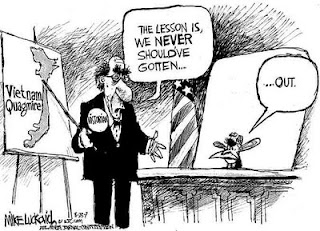
Hello everyone!
In this post, I plan to bring up a very, very difficult and controversial subject.
Namely how a country can go from the horrors of one war and then start another while it remains in living memory.
Imagine a country that has just experienced a humiliating defeat in war:
Throughout it's duration the reports given by generals to the public said that they were winning the battles and gaining ground. BUT the generals warned in order to truly win this war, the civilian must make the extra efforts to support the soldiers and support the military. Above all they must not cotton to or tolerate various elements in society, that would undermine them and give comfort to the nation's enemies. At the beginning of the war, the Generals and most of the politicians claimed that a quick victory was in the making even using phrases such as "by this Christmas". But as the war dragged on, and the easy victory seemed increasingly elusive more generals, politicians, and members of the public started to blame both the media and various subversive elements.
Finally, the war ended in what much of the public considered a bitter humiliation. Right winged members of society began to claim that the brave soldiers had been "stabbed in the back" by certain well known known scapegoast, and a bitter "culture war" developed between right and left. And within 30 years an extremely reactionary political cabal seized control of the governemnt.
But within the first few years after the war, an increasingly progressive government seemed more or less a foregone conclusions. However looking back it became obvious that the right winged elements of society had begun to quietly organize first few years after the war-before they would become vocal and to many people downright intimidating. In recounting the ways in which they had been betrayed they began to tell certain stories. Some of which were told so many times as to have become mythologized wildly beyond any real incidents on which they may or may not have been based.
One of the most famous was:
"When I came back from the war, I was spat on by a Jew."
"A Jew?" you may ask. "Don't you mean a hippie, a peacenik, or a liberal?"
Nope, I did mean a "A Jew". For this wasn't America after the Vietnam War, but Germany after WWI.
And the right winged factions that told this tale were widely known as The Freikorps, paramilitary organizations that started in Germany after the end of "The Great War". During the early Weimar period they operated largely as mercenaries, but later on more and more of their activities involved attacking and often killing labor unionists,
 socialists, and other activist groups they didn't like. Indeed this may explain much of the "passivity" of the German people under Hitler:the elements in society that would have resisted the most, were systematically wiped out or driven from the country. And of course, the claims that the Jews (along with the Communists and civilian population at large) were the ones who "stabbed Germany in the back", or were the ones who spat on returning soldiers were already common when Hitler was at most an obscure figure.
socialists, and other activist groups they didn't like. Indeed this may explain much of the "passivity" of the German people under Hitler:the elements in society that would have resisted the most, were systematically wiped out or driven from the country. And of course, the claims that the Jews (along with the Communists and civilian population at large) were the ones who "stabbed Germany in the back", or were the ones who spat on returning soldiers were already common when Hitler was at most an obscure figure.Until recently their role in history received almost no attention outside of Germany, but in the past few years they have received more and more recognition for their role in having set the foundations for Nazism. Indeed many high ranking Nazis had Freikorps pasts such as Rudolf Hoess, Heinrich Himmler, Martin Bormann, Adolf Eichman and many others. Also most of the leaders of Hitler's Sturmarbteilung or Stormtroopers, except for Der Fuhrer himself had a Freikorps background.
It's a fascinating and disturbing portion of history for all who wish to read about it.
Which brings us to Iraq. Of course, it's long been noted that Bush went into Iraq without an exit strategy. But the neo-cons did have a plan as to who was going to get the blame if the war in Iraq didn't go well.
They plan to blame YOU. That is if you are an American civilian who did not actually fight in Iraq or Afghanistan. No, this isn't just those of you who protested or at least opposed the Iraq War. I would never make such an assumption about the political beliefs of my readers-indeed one CAN'T make such assumptions about what one posts on the internet. While I know for a fact that many of you did oppose the war, and some were involved in the anti-war movement, the fact is that even those of you who might have gone along meekly, supported the war, supported the President, or even put a yellow ribbon on your car, were all marked as scapegoats from the very beginning. If some of you might have kept your mouths shut about the war for fear that you would be seen as "not supporting the troops", I can tell you that your attempts to avoid being blamed was pointless.
Because I can almost guarantee that at least some factions in our society WILL blame the civilian population for the war. If they don't blame you for protests or "America hating" opposition, they will blame you for not supporting the troops "enough". Failing that they will blame you for not going, or not signing up any adult children to go to Iraq. Of course, adult children are the ones with the authority to sign themselves up, but they won't let such details bother them or perhaps they will blame the way you raised them.
But one way or another the handwriting IS on the wall. Look for these factions to start showing up in America soon after the Iraq War ends. The only remaining questions are how much the people buy into their lies, and how much power we give them. And if you let their attempts to blame you for Iraq as well as Vietnam, the answer could become "quite a lot". And the recriminations over Iraq could lead millions of Americans to remain silent when the next shocking thing happens.
The political machinery for such blame games are entrenched into our political culture, from Vietnam. Much of the population is cowed by it and afraid to speak out.
As history tells us that can be a dangerous things.
Say Goodnight Readers







